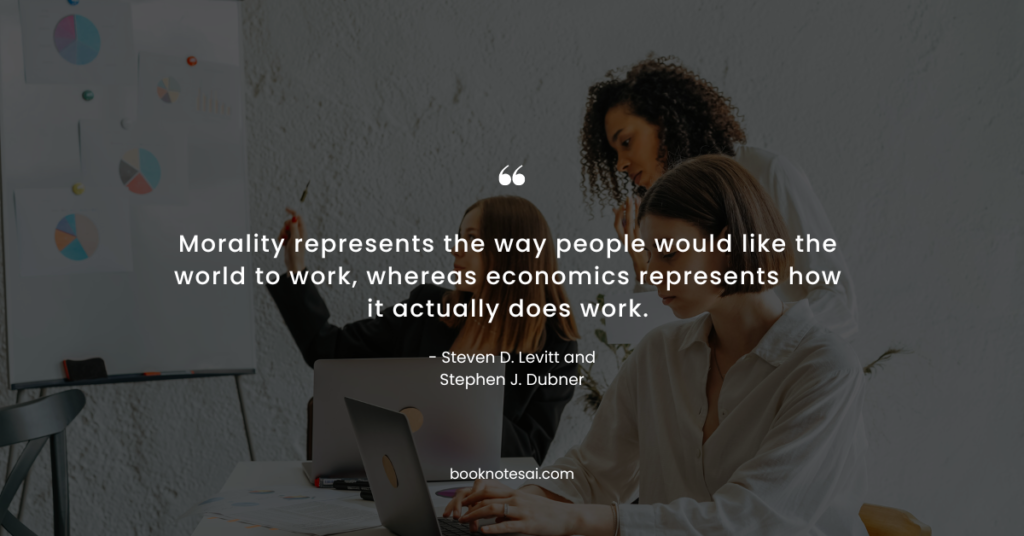Listen To This Post
A Rogue Economist Explores the Hidden Side of Everything.
Which is more dangerous, a gun or a swimming pool?
Which should be feared more: snakes or french fries?
Why do sumo wrestlers cheat?

This is a book summary for Freakonomics written by Steven D. Levitt and Stephen J. Dubner. The most essential information is streamlined and structured to be practical, straightforward, and incredibly valuable, all while saving you tons of time.
Introduction: Why this book?
- Delving into the hidden intricacies of economics, Freakonomics uncovers fascinating insights that challenge conventional wisdom.
- By unraveling the unexpected connections between seemingly unrelated phenomena, Levitt and Dubner invite readers to perceive the world through a new lens of curiosity and critical thinking.
Freakonom Summary:
- Freakonomics embarks on a captivating journey through the lens of economics, exploring diverse topics from the economics of drug dealing to the impact of parenting on children’s success.
- Levitt and Dubner artfully blend economics with real-world scenarios, challenging readers to question prevailing assumptions and embrace unconventional perspectives.
- Through engaging storytelling and rigorous analysis, the book sheds light on the hidden dynamics that shape human behavior and societal outcomes.
💡 5 Big Ideas
- Incentives Drive Behavior: Levitt and Dubner argue that people respond to incentives, often in unexpected ways, highlighting the profound influence of incentives on human decision-making.
- Correlation vs. Causation: The authors emphasize the importance of distinguishing between correlation and causation, urging readers to critically evaluate statistical relationships to uncover underlying truths.
- Unintended Consequences: Freakonomics explores the unintended consequences of policy interventions and societal norms, revealing how well-intentioned actions can produce unforeseen outcomes.
- Information Asymmetry: Levitt and Dubner illuminate the power dynamics inherent in information asymmetry, demonstrating how disparities in knowledge influence market dynamics and social interactions.
- Rethinking Conventional Wisdom: Through provocative analysis, the book challenges conventional wisdom, encouraging readers to question established narratives and embrace a mindset of intellectual curiosity and skepticism.
In essence, Freakonomics serves as a thought-provoking exploration of the hidden forces that shape human behavior and societal phenomena, urging readers to reevaluate their perceptions of cause and effect.
Powerful Quotes
- “Morality, it could be argued, represents the way that people would like the world to work, whereas economics represents how it actually does work.”
This quote emphasizes the disparity between moral ideals and economic realities. - “If you can identify what people care about, you understand them.”
This quote highlights the significance of incentives in driving human behavior. - “Knowing what to measure and how to measure it makes a complicated world much less so.”
This quote underscores the importance of data-driven decision-making in navigating complexity. - “Conventional wisdom is often wrong.”
This quote challenges readers to question established beliefs and embrace a spirit of skepticism. - “The conventional wisdom is often wrong. And if we can just peel back the onion and look at the data in a fresh way, we can often come up with a new conventional wisdom.”
This quote underscores the transformative power of data analysis in challenging prevailing assumptions. - “People are good at figuring out what’s in their own best interest.”
This quote reflects the authors’ belief in the rationality of human decision-making. - “Incentives are the cornerstone of modern life.”
This quote emphasizes the pervasive influence of incentives in shaping human behavior and societal outcomes. - “The conventional wisdom is often wrong. And if we can just peel back the onion and look at the data in a fresh way, we can often come up with a new conventional wisdom.”
This quote highlights the transformative potential of data analysis in challenging prevailing assumptions. - “The conventional wisdom is often wrong, and a prophet in the desert is often dismissed.”
This quote underscores the authors’ willingness to challenge conventional wisdom and embrace unconventional perspectives. - “Morality represents the way people would like the world to work, whereas economics represents how it actually does work.”
This quote encapsulates the tension between moral ideals and economic realities.
One Reason To Read This Book:
Freakonomics offers a refreshing perspective on the interplay between economics and everyday life, challenging readers to question conventional wisdom and embrace a mindset of intellectual curiosity.
Who should I recommend “Freakonomics” Summary to?
Anyone curious about the hidden dynamics driving human behavior and societal outcomes would find Freakonomics enlightening.
The professionals in fields such as economics, sociology, and psychology, as well as general readers seeking thought-provoking insights, will benefit from its unconventional approach.
Recommendations:
- “SuperFreakonomics: Global Cooling, Patriotic Prostitutes, and Why Suicide Bombers Should Buy Life Insurance” by Steven D. Levitt and Stephen J. Dubner
- “Think Like a Freak: The Authors of Freakonomics Offer to Retrain Your Brain” by Steven D. Levitt and Stephen J. Dubner
- Freakonomics Radio (Podcast) – Hosted by Stephen J. Dubner, explores the hidden side of everything through interviews, storytelling, and compelling analysis
This summary serves as a complimentary guide to the reviewed title Freakonomics offering key insights. For a deeper understanding, we encourage you to explore the full book.


